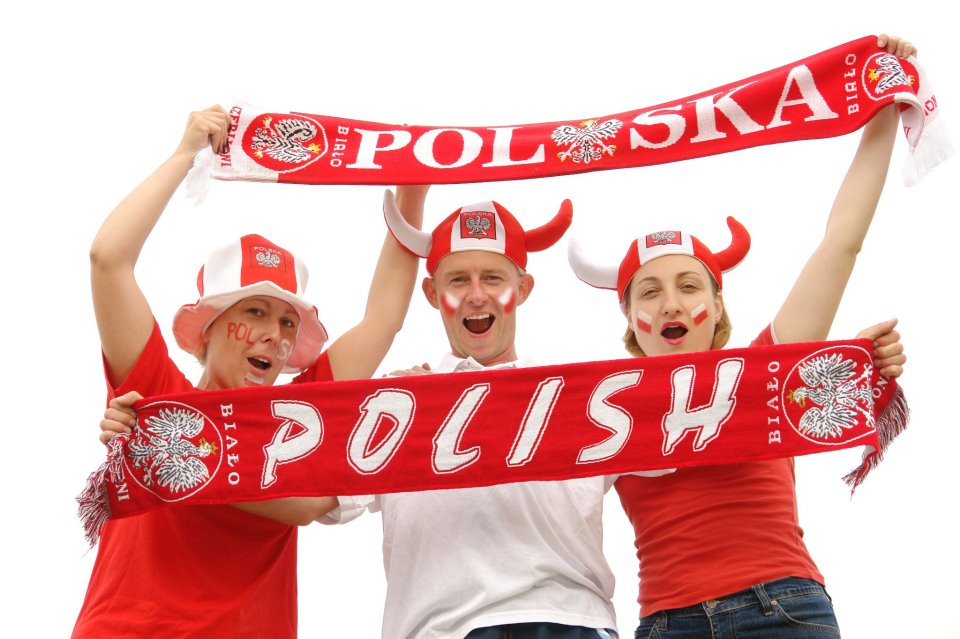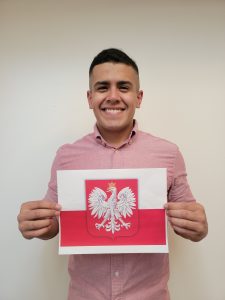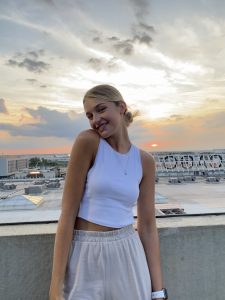Lapinski Scholarship Winners Highlight Importance of Polish Language in Connecting with Family and Building Communities

Each year, the UW–Madison Polish Studies Program announces the recipients of the Lapinski scholarship, received as a generous endowment from the will of Mrs. Leona Lapinski Leute. The Lapinski fund provides financial support for UW undergraduate and graduate students studying the Polish language, literature, and culture. The annual application deadline for the Lapinski scholarship is March 1 (or the first Monday after that). The funds are awarded in the spring for the whole upcoming academic year.
In its inaugural year, the Lapinski fund awarded students with some $25,000 in scholarship money. Since then, the funds have continued to support UW students in Polish studies to this day. For the 2021/2022 year, the Lapinski awards went to Gabriel A. Barahona Maldonado, a sophomore from Baraboo, Wisconsin, and Sandra Sobus, a sophomore from Chicago, Illinois. Congratulations, Gabriel and Sandra! Gratulacje!
To celebrate their achievement with the larger UW–Madison community, we asked Gabriel and Sandra to tell us more about themselves. Below, we present their profiles, including their initial interest in the Polish language and culture, career plans, and advice for anyone wanting to start learning all things Polish.
Gabriel A. Barahona Maldonado

Originally from San Juan, Puerto Rico, Gabriel moved with his family to Baraboo, Wisconsin, when he was about five. With Spanish as his native language, he learned English in school and later added French and Polish to his repertoire. Before completing two semesters of Polish at UW–Madison, he started learning Polish in his senior year in high school. Gabriel majors in Polish and Computer Science with a certificate in French, all with honors. A true polyglot in the making, he started learning Mandarin Chinese last year.
Lost without translation
As it turned out, Gabriel’s desire to learn Polish grew from a real communication problem he encountered in his family.
“My aunt comes from Warsaw, Poland, so she speaks Polish fluently. Her mom moved to the U.S. a few years ago and now lives with my aunt, her daughter. Back then, it was especially hard for her to speak English since she was just starting out. Every time my family would go visit, my aunt’s mom would always be sitting alone, waiting for her daughter to translate,” he explains.
“I felt bad for her and knew how hard it could be to learn a new language, so I decided to learn a few simple words and sentences to surprise her. After I started learning Polish, I quickly grew more and more interested in the language that I am now majoring in it!”
Currently, Gabriel is taking the first semester of the third-year Polish course (Slavic 277). His immediate goal is to become more comfortable speaking Polish and expand his vocabulary. In the future, he hopes to find a career in computer science where he will be able to capitalize on his language skills, especially Polish, to help customers and users.
“After I started learning Polish, I quickly grew more and more interested in the language that I am now majoring in it!”
The key is to not give up
In his view, patience is crucial when it comes to learning a language like Polish. Asked about specific advice for those wanting to immerse themselves into all things Polish, he says to be brave and go for it.
“If you really want to learn Polish, don’t be dissuaded by hard concepts like grammar or pronunciation. Those all come with time.”
“I remember the first few months of starting out Polish, it was extremely confusing, especially the cases,” he reminisces. “I couldn’t wrap my head around some of the grammar rules and idiomatic phrases, but with time, I slowly learned to understand and just accept the grammar for how it is. If you really want to learn Polish, don’t be dissuaded by hard concepts like grammar or pronunciation. Those all come with time. The most important thing is to not give up,” he concludes.
If you speak Polish, it goes to their hearts
Is it worth studying Polish and Poland? For Gabriel, the answer is a definite yes.
“I believe that studying the Polish language is completely worth it because there are over 50 million Polish speakers in the world. Especially here in Wisconsin, there are a lot of Polish immigrants,” he notes before explaining the practical and social benefits of speaking Polish with Poles.
“Poles are incredibly nice and hospitable, and come from a rich culture. The history of Poland is even better. All things Polish are absolutely worth studying.”
“Polish people absolutely love it when they hear foreigners trying to speak their language,” Gabriel stresses. “Even though most Poles learn English growing up and throughout school, they still love knowing that there are people who are actively trying to learn their language. They are incredibly nice and hospitable, and come from a rich culture. The history of Poland is even better. Just this past century alone, Poland has undergone radical changes, including gaining its independence. All things Polish are absolutely worth studying,” he affirms.
Sandra Sobus

Originally from Chicago, Illinois, Sandra is a sophomore studying Communication Sciences and Disorders. Growing up, she attended Polish school every Saturday from kindergarten to eighth grade at the St. Ferdinand Polish School (Pol. Polska Szkoła im. Św. Ferdynanda). She also participated in numerous school activities such as decathlons, poetry recitals, art contests, cultural presentations, and religious ceremonies.
Both her parents and her more distant family come from Poland, which she is yet to visit. “I would love to visit someday as I have learned about Poland’s beautiful landmarks and culture my whole life,” she notes. “I love being able to communicate with people using the Polish language and feel connected to a community full of people that feel at home.”
Every day is a Polish day
Currently, Sandra is taking the Third Semester Polish course, which helps her practice Polish regularly while away from her family. She also wants to obtain a certificate in East-Central European Languages, Literatures, and Cultures (ECELLC).
“I love being able to strengthen my foundation of the Polish language and be able to practice it even though I am not at home where I speak it every day!”
“I decided to continue my Polish education at UW–Madison because I was not as active in the Polish community in high school,” she explains. “I love being able to strengthen my foundation of the language and be able to practice it even though I am not at home where I speak it every day! I am also an active member of the Polish Student Association where I can connect with other Polish students.”
Understanding language is understanding culture
In the future, Sandra would like to work as a speech-language pathologist and believes that speaking another language will consequently make her better at her job.
“I would interact with children to improve their communication skills and aid in intervention for their success. I believe my knowledge of another language has shaped me to understand cultural differences, which will aid me in my future career,” she observes.
“I would suggest starting by increasing your interest in Polish and Poland through things like books, videos, clubs, and more. This will definitely motivate you to get involved and learn Polish.”
When asked for advice for learning more about Polish culture and Poland, Sandra says to go for it.
“Although it may sound difficult, it is beyond rewarding to watch yourself immerse into a different culture and context,” she observes. “I would suggest starting by increasing your interest in Polish and Poland through things like books, videos, clubs, and more. This will definitely motivate you to get involved and learn Polish,” she concludes.
Read also:
Announcing Madison Polish Film Festival 2021
Polish Student Association Offers a Menu of Activities for Students Hungry for Polish Culture
* * *
UW–Madison Polish Studies Program
Educating the Wisconsin public about the Polish language, literature, and culture since 1936.
The University of Wisconsin–Madison Polish Studies Program is the oldest academic program in the United States focused on the study and teaching of the Polish language, literature, and culture. UW–Madison Polish studies offer a comprehensive package of Polish language, literature, and culture courses, a generous scholarship program designed exclusively for its students, and various extracurricular activities each academic year.
The program, dating back to 1935, offers beginning, intermediate, and advanced Polish language courses, in addition to intensive Polish courses for heritage speakers and (under)graduate students. In 2011, the program received the prestigious Polonicum Award Distinction from the University of Warsaw for its achievements in promoting the Polish language and knowledge about Polish culture and history. The UW–Madison Polish program also offers a broad range of Polish culture courses on Polish film, contemporary Polish culture, Polish migration to the Americas, a survey of Polish culture from the Middle Ages to modern times, Polish comedy culture, and post-communism.
Each year, the UW Polish program awards scholarships for tuition through the Lapinski fund to undergraduate and graduate students studying the Polish language, literature, and culture. The Polish Student Association (PSA) provides a space for all students interested in events, activities, and learning about Poland and Polish culture. In collaboration with the Polish program faculty, the PSA also co-organizes the Madison Polish Film Festival, an annual celebration of Polish cinematography in Madison, Wisconsin, now in its 31st edition.